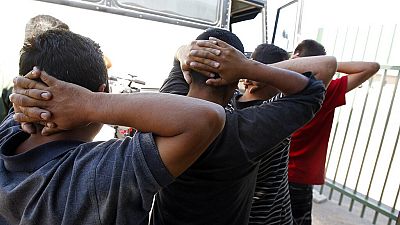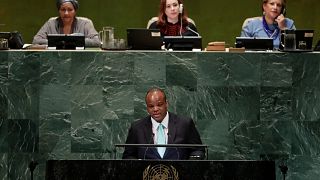Eswatini
Five men deported by the U.S to Eswatini are being held in solitary confinement indefinitely until they can be sent back to their home countries with the help of the UN, an Eswatini government spokesperson said on Thursday.
Local media reported that the migrants are at the Matsapha Correctional Complex outside Mbabane, which includes Eswatini's top maximum-security prison.
However, Thabile Mdluli, the spokesperson of the Eswatini government, declined to identify the correctional facility where the five men are being held, citing security concerns.
The U.S. has previously deported eight men to South Sudan, following the Supreme Court's removal of restrictions on sending individuals to nations where they lack connections. Additionally, the U.S. has sent hundreds of Venezuelans and others to Costa Rica, El Salvador, and Panama.
The migrants held in Eswatini are citizens of Vietnam, Jamaica, Cuba, Yemen and Laos, and are all convicted of serious crimes including murder and child rape, the U.S. Department of Homeland Security said, describing the men as "individuals so uniquely barbaric that their home countries refused to take them back".
The statement by Homeland Security goes directly against Eswatini's claim that the men would be sent back home, which raises questions about how long the migrants could end up staying in the Eswatini prison.
Mdluli said that there was no set timeline for when the migrants would be able to return home, as it depends on several factors, including the involvement of the UN's International Organisation for Migration (IOM), which Eswatini is counting on to assist with the deportation process.
The IOM stated that it was not involved in the operation and had not been approached to assist in the matter, but would be willing to help "in line with its humanitarian mandate."
Long periods of solitary confinement can cause cognitive disturbances, including depression, paranoia and psychosis, according to Penal Reform International.
Solitary confinement also increases the risk of torture or ill-treatment in prison going undetected, and "it can in itself constitute torture and ill-treatment, in particular where it is prolonged or indefinite", said the NGO in a statement.














01:28
United States officially exits the World Health Organization
Go to video
South African court clears sale of Nelson Mandela artefacts
01:01
South Africa to step aside from G20 during United States presidency
01:00
Fifa pass launches to help fans travel to US for 2026 World Cup
Go to video
TikTok finalizes a deal to form a new American entity
Go to video
Uganda election violence: Bobi Wine ally arrested